
This post has taught me a lesson: never leave your food lying around while you are setting up your food photography shot, or it might get eaten before you’re finished! After setting up my brioche shot, I went away for awhile and when I came back, someone (aka my daughter) had taken a huge bite out of the brioche. Good thing I had a few ‘spares’ lying around. Then, I went away again and found that my daughter-in-law had now taken a huge bite out of the new brioche! I guess brioches are so good that people just can’t help themselves!
Are they bread or pastry?
As I started to write this post, I wondered whether a brioche is considered to be a bread or a pastry? Wikipedia has shed some light on this question, saying a brioche is made in the same way as bread but has a ‘richer aspect of pastry’ due to the addition of the extra eggs, butter and sugar. Whatever brioches are called, I love them; they’re extra light and flaky, no doubt caused by the large amount of butter incorporated into the dough. I added a personal touch to my recipe by adding a dollop of lemon curd in the center of the brioche after being baked. Hmmm, I think my brioche is starting to sound like a pastry, don’t you?
The French typically eat les brioches with jam and butter for breakfast or with a coffee break, but one might be forgiven for waking up at midnight to have a bite or two. Julia Child has a 7-page long instruction on how to make brioches in her book Mastering the Arts of French Cooking but my version is a lot simpler using an electric mixer or food processor.
Brioches are usually made with some sort of fluted tin that flares outward a bit- I used several small tart pans for my brioche with the lemon curd filling and then used a regular cake pan for my larger brioche (with no filling).
The brioche dough is rather wet and gloopy after the first rising so you’ll need to place it in the fridge for several hours (or overnight) to be able to congeal the butter and allow you to shape the dough. After resting in the fridge, the dough is formed into small balls; one ball is first placed in the center of the baking tin, then 5 balls are arranged around it and then one final ball is placed on top. After doubling in size, the brioches are baked in the oven, the ‘top ball’ is then removed and a lovely dollop of lemon curd placed in the middle of the brioche.
P.S. Would LOVE it if you’d Like my G’day Souffle’ Facebook page!
5 balls are arranged around a center ball, then one final ball placed on top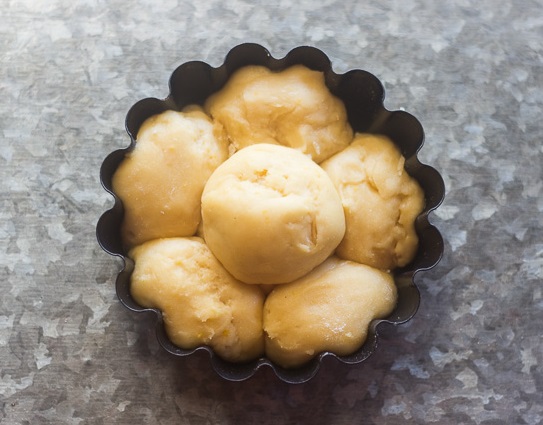
Mmmm, les brioches straight out of the oven!
Large Brioche baked in a cake pan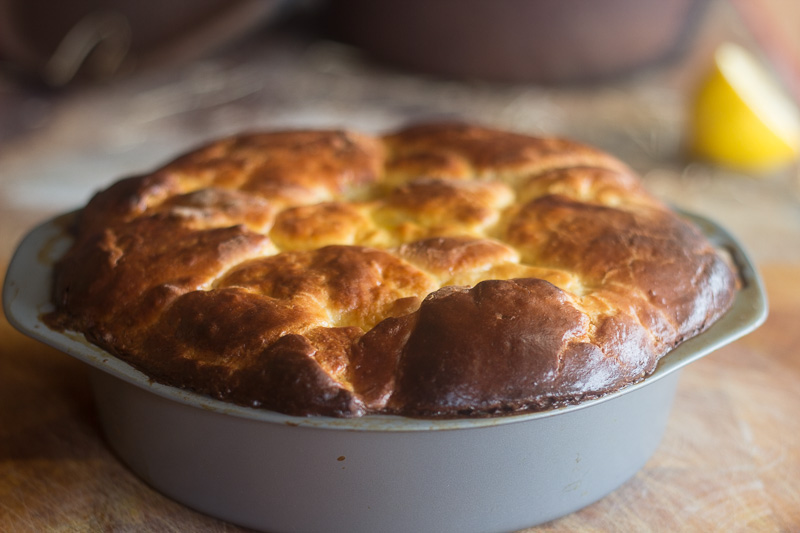
- 4 small tart pans, about 4 ½ (11 cms) inches wide or one large oven-proof bowl
- 1 sachet (7 gm) dried yeast
- 1/2 cup lukewarm milk
- 1/2 cup caster sugar
- Finely grated rind of 1 orange
- 2 1/3 cups plain flour
- 3 eggs + 1 extra for eggwash
- 6 oz (185 gm) softened butter
- 2 eggs + 2 egg yolks
- 3/4 cup caster sugar
- 1/3 cup (80 gm) softened butter
- Zest and juice from 2 lemons
- Whisk whole eggs, yolks and sugar in a saucepan until smooth, then place pan over a low heat. Add the butter, juice and zest and whisk continuously until thickened. Strain through a sieve into a small bowl and place in fridge until ready to use.
- Combine the dry yeast and warm milk in a small bowl; let rest for a few minutes until the yeast is completely dissolved. Add the sugar and orange rind and stir; transfer ingredients to the bowl of an electric mixer fitted with a dough hook (or food processor fitted with a 'dough blade’).
- Add the flour in 3 batches along with an egg with each, kneading (mixing) until smooth between each addition. With the motor running, gradually add the softened butter and mix for 3-4 minutes until the batter is smooth and shiny.
- Transfer to a buttered bowl, cover with plastic wrap in a warm place until the mixture doubles in size (1 - 2 hours). Knock the dough back down, cover the bowl with plastic wrap and weight the dough down with a plate. Place in fridge for 3-4 hours or overnight.
- Transfer the dough onto a lightly floured board and knead for one minute into a ball shape. Divide the dough into small balls about 1 inch wide (the size of the balls will depend on the size of your tart pans or the bowl that you use). Place one ball in the center of your pan, then arrange 5-6 balls around it. Using your index finger, make a small indentation in the center ball; this is where the lemon curd filling will go after the brioche has been baked. Now place one more ball on top of the center ball.Repeat this with the other tart pans.
- Cover the pans with a tea towel and stand in a warm place until the dough has doubled in size. Brush the dough with eggwash (one egg combined with a little water) and bake in a pre-heated oven at 180 C (350 F) for 20-25 minutes, or until the dough has turned golden brown.
- Remove from the oven and let cool for a few minutes. Remove the brioche from the tins (or bowl); remove the top ball from the center of the brioche and add a small amount of lemon curd into the center of each brioche. Serve warm on the day of baking or lightly toasted the following day.

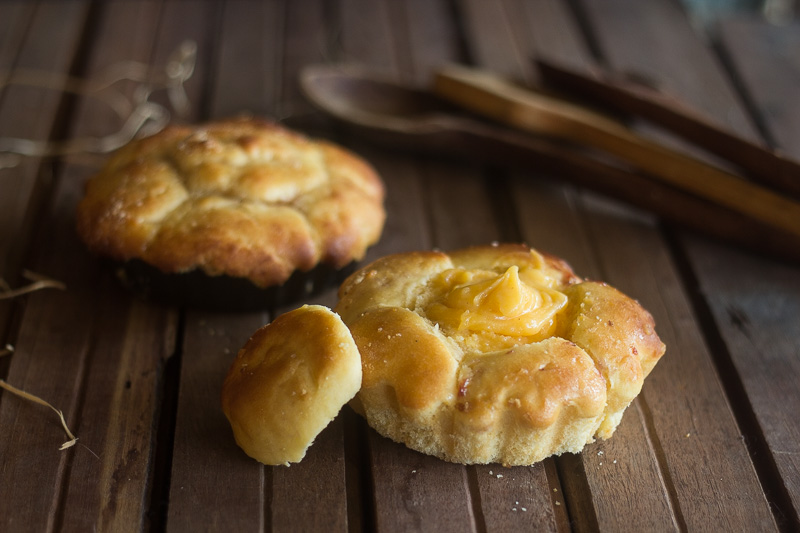

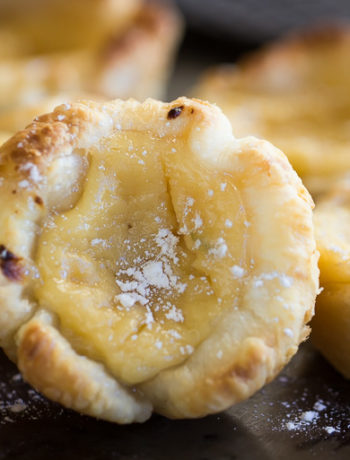
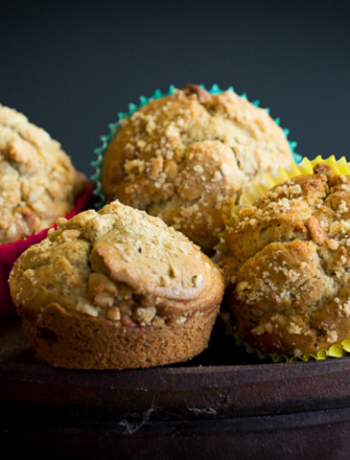
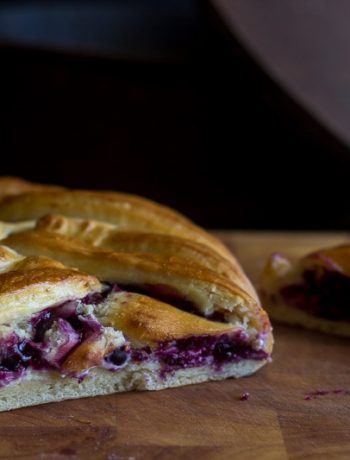
11 Comments
Kathy @ Beyond the Chicken Coop
August 20, 2015 at 10:27 pmMy kids always feel soooo deprived because I make them wait to eat the cookies until after I’m sure I have a good picture. They just look at me like….”How long do I have to wait?”
I think I’d sneak a piece of this brioche before you were done too. Love lemon curd and it sounds perfect in this bread.
Fran
August 21, 2015 at 8:15 pmThanks Kathy. Even I can’t wait sometimes to sample some of my food while photographing it- sometimes some small bites have been known to appear in my food while I try to photograph it!
John@Kitchen Riffs
August 21, 2015 at 12:14 amI always think of brioche as a sweet bread — more bread than pastry, but definitely shares many aspects of pastry. Really I think of it as “good.” 🙂 Love lemon curd, and by filling the brioche with it you’ve really taken it into the pastry realm, IMO. But I’ll eat it — with gusto! — no matter what it’s called.
Thalia @ butter and brioche
August 21, 2015 at 11:22 amYES to anything brioche. This lemon curd filled brioche is just perfect.
Lynn @ Oh-SoYummy
August 24, 2015 at 5:52 amoh! i didn’t even know that brioche was made that way! i always learn something new from your blog! i’ve never heard of caster sugar before. can i substitute regular granulated white sugar or should i just blend it smaller for this? also which type of yeast is ‘dried yeast’ ?
just liked your facebook page. thought i was already a fan but now i am for sure! 🙂
Fran
August 25, 2015 at 2:29 pmLynn, thanks so much for the Face Book ‘like.’ Caster sugar is finer than granulated sugar so it’s ideal for cakes and breads, but you could use granulated sugar for this brioche recipe. ‘Dried yeast’ is a powdery yeast that comes in small packets- it is an active dry yeast (where the yeast is alive but inactive due to lack of moisture) – it’s different from compressed fresh yeast. In the USA, ‘Fleishmann’s Yeast’ is a well-known brand of dried yeast.
Denise Browning@From Brazil To You
August 26, 2015 at 3:07 amWhat a great idea fill these brioches with lemon curd. Between my eldest daughter and I, I would not know who would devour more of these. 🙂
Gourmet Getaways
August 27, 2015 at 8:44 pmOH MY!!
These look amazing, I don’t know what I enjoy more, brioche or lemon curd, but the combination would be a winner in this house!!
Yum!
Thanks so much for sharing!
Julie
Daniela
August 30, 2015 at 6:39 amWow Fran, I always thought nothing beats the taste of freshly made brioche but freshly made brioche with lemon curd is even better.
Amira
September 1, 2015 at 4:00 amWhat a lovely idea!! this is making me drool here 🙂
Simply Sweet Justice
February 9, 2016 at 1:38 amI made brioche for the first time a few months ago. It was such a great! I am going to try this and will use Meyer lemons for the filling. Yum!